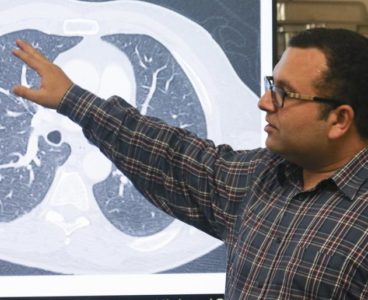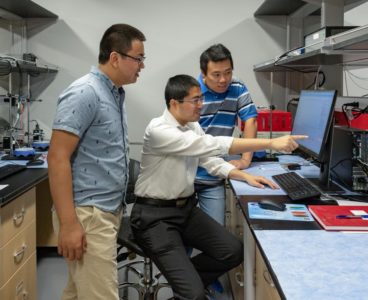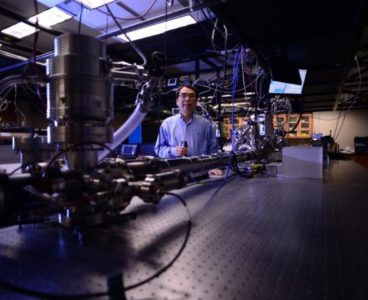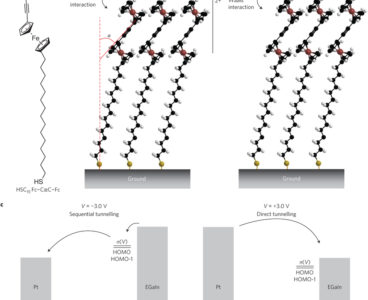Doctors may soon have help in the fight against cancer thanks to the University of Central Florida’s Computer Vision Research Center. Engineers at the center have taught a computer how to detect tiny specks of lung cancer in CT scans, which radiologists often have a difficult time identifying. The artificial intelligence system is about 95…
Optical Sensor Determines if Molecules are Left- or Right-Handed
A University of Central Florida team has designed a nanostructured optical sensor that for the first time can efficiently detect molecular chirality – a property of molecular spatial twist that defines its biochemical properties. Determining chirality is critical for new drug development. Think of molecules as having little hands. They are not identical, but they…
A Green Approach to Making Ammonia Could Help Feed the World
A UCF research team with collaborators at Virginia Tech have developed a new “green” approach to making ammonia that may help make feeding the rising world population more sustainable. “This new approach can facilitate ammonia production using renewable energy, such as electricity generated from solar or wind,” said physics Assistant Professor Xiaofeng Feng. “Basically, this…
Tricking Photons Leads to First-of-its-Kind Laser Breakthrough
Nanomaterial Pulls Hydrogen Fuel from Seawater
The Future of Sustainable Battery Technology
University of Central Florida Assistant Professor Yang Yang’s research group has developed two promising energy storage technologies in its work with sustainable energy systems. Yang sees revolutionary systems that can produce and store energy inexpensively and efficiently as a potential solution to energy and environmental crises. “We try to convert solar energy either to electricity…
Researchers Set Record for Fastest Light Pulse
A research team at the University of Central Florida has demonstrated the fastest light pulse ever developed, a 53-attosecond X-ray flash. The group led by Professor Zenghu Chang beat its own record set in 2012: a 67-attosecond extreme ultraviolet light pulse that was the fastest at the time. At one-quintillionth of a second, an attosecond…
Nanoparticles Loaded With Component of Common Spice Kill Cancer Cells
New Data, Advanced Modeling Techniques Suggest Extreme Coastal Sea Levels More Likely to Occur
Improving projections for how much ocean levels may change in the future and what that means for coastal communities has vexed researchers studying sea level rise for years, but a new international study that incorporates extreme events may have just given researchers and coastal planners what they need. The study, published today in Nature Communications uses newly…
Molecular Electronics Scientists Shatter ‘Impossible’ Record
An international research team that includes University of Central Florida Professor Enrique del Barco, Damien Thompson of the University of Limerick and Christian A. Nijhuis of the National University of Singapore has cracked an important limitation that for nearly 20 years has prevented the practical use of molecular diodes. Electrical circuits are the basic building…
Scientist Invents Way to Trigger Artificial Photosynthesis to Clean Air
A chemistry professor in Florida has just found a way to trigger the process of photosynthesis in a synthetic material, turning greenhouse gases into clean air and producing energy all at the same time. The process has great potential for creating a technology that could significantly reduce greenhouse gases linked to climate change, while also…
Light Beam Replaces Blood Test During Heart Surgery
A University of Central Florida professor has invented a way to use light to continuously monitor a surgical patient’s blood, for the first time providing a real-time status during life-and-death operations. The technology developed by UCF scientist Aristide Dogariu uses an optical fiber to beam light through a patient’s blood and interpret the signals that…
New, Old Science Combine to Make Faster Medical Test
A UCF researcher has combined cutting-edge nanoscience with a magnetic phenomenon discovered more than 170 years ago to create a method for speedy medical tests. The discovery, if commercialized, could lead to faster test results for HIV, Lyme disease, syphilis, rotavirus and other infectious conditions. “I see no reason why a variation of this technique…
Nanoscience Creates a Faster Medical Test
A University of Central Florida researcher has combined cutting-edge nanoscience with a magnetic phenomenon discovered more than 170 years ago to create a method for speedy medical tests. The discovery, if commercialized, could lead to faster test results for HIV, Lyme disease, syphilis, rotavirus, and other infectious conditions. “I see no reason why a variation…
Research Finds Google Glass Technology May Slow Down Response Time
Heads-up display technology — think Google Glass — offers lots of information to users in seconds, literally in front of their eyes. Access to information is critical in today’s fast-paced world, but new research at the University of Central Florida indicates that the multitasking needed to process that readily available information may slow down the…











